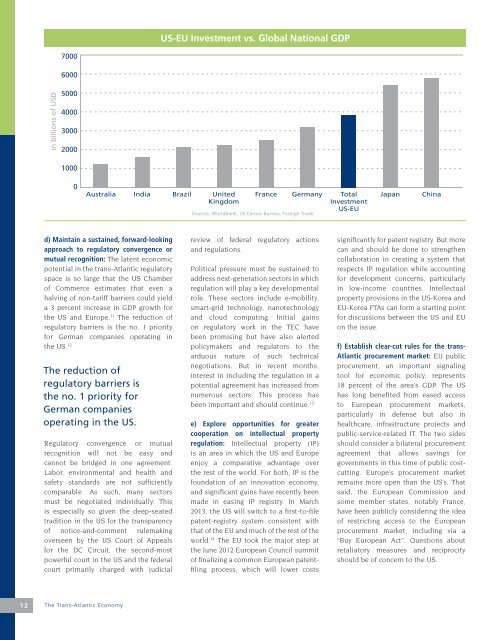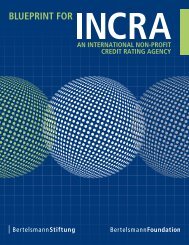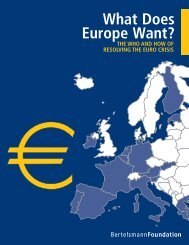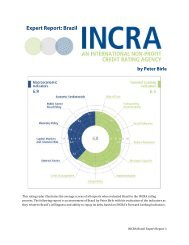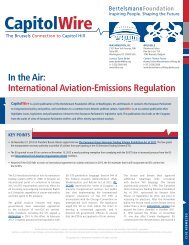BF-FieldManual-FEB13 -3.pdf - Bertelsmann Foundation
BF-FieldManual-FEB13 -3.pdf - Bertelsmann Foundation
BF-FieldManual-FEB13 -3.pdf - Bertelsmann Foundation
- No tags were found...
Create successful ePaper yourself
Turn your PDF publications into a flip-book with our unique Google optimized e-Paper software.
US-EU Investment vs. Global National GDP70006000in billions of USD500040003000200010000Australia India Brazil UnitedKingdomFrance Germany TotalInvestmentUS-EUSources: WorldBank; US Census Bureau, Foreign TradeJapanChinad) Maintain a sustained, forward-lookingapproach to regulatory convergence ormutual recognition: The latent economicpotential in the trans-Atlantic regulatoryspace is so large that the US Chamberof Commerce estimates that even ahalving of non-tariff barriers could yielda 3 percent increase in GDP growth forthe US and Europe. 11 The reduction ofregulatory barriers is the no. 1 priorityfor German companies operating inthe US. 12The reduction ofregulatory barriers isthe no. 1 priority forGerman companiesoperating in the US.Regulatory convergence or mutualrecognition will not be easy andcannot be bridged in one agreement.Labor, environmental and health andsafety standards are not sufficientlycomparable. As such, many sectorsmust be negotiated individually. Thisis especially so given the deep-seatedtradition in the US for the transparencyof notice-and-comment rulemakingoverseen by the US Court of Appealsfor the DC Circuit, the second-mostpowerful court in the US and the federalcourt primarily charged with judicialreview of federal regulatory actionsand regulations.Political pressure must be sustained toaddress next-generation sectors in whichregulation will play a key developmentalrole. These sectors include e-mobility,smart-grid technology, nanotechnologyand cloud computing. Initial gainson regulatory work in the TEC havebeen promising but have also alertedpolicymakers and regulators to thearduous nature of such technicalnegotiations. But in recent months,interest in including the regulation in apotential agreement has increased fromnumerous sectors. This process hasbeen important and should continue. 13e) Explore opportunities for greatercooperation on intellectual propertyregulation: Intellectual property (IP)is an area in which the US and Europeenjoy a comparative advantage overthe rest of the world. For both, IP is thefoundation of an innovation economy,and significant gains have recently beenmade in easing IP registry. In March2013, the US will switch to a first-to-filepatent-registry system consistent withthat of the EU and much of the rest of theworld. 14 The EU took the major step atthe June 2012 European Council summitof finalizing a common European patentfilingprocess, which will lower costssignificantly for patent registry. But morecan and should be done to strengthencollaboration in creating a system thatrespects IP regulation while accountingfor development concerns, particularlyin low-income countries. Intellectualproperty provisions in the US-Korea andEU-Korea FTAs can form a starting pointfor discussions between the US and EUon the issue.f) Establish clear-cut rules for the trans-Atlantic procurement market: EU publicprocurement, an important signalingtool for economic policy, represents18 percent of the area’s GDP. The UShas long benefited from eased accessto European procurement markets,particularly in defense but also inhealthcare, infrastructure projects andpublic-service-related IT. The two sidesshould consider a bilateral procurementagreement that allows savings forgovernments in this time of public costcutting.Europe’s procurement marketremains more open than the US’s. Thatsaid, the European Commission andsome member states, notably France,have been publicly considering the ideaof restricting access to the Europeanprocurement market, including via a“Buy European Act”. Questions aboutretaliatory measures and reciprocityshould be of concern to the US.1 2The Trans-Atlantic Economy


